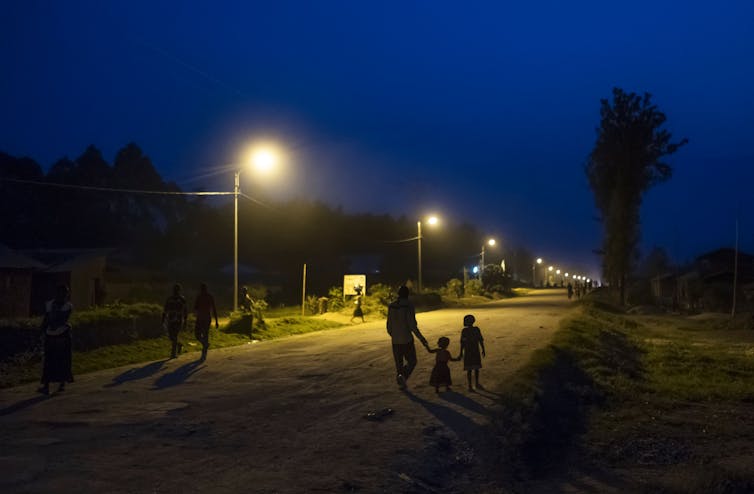It is generally easier for countries that offer development finance for energy projects to make low-carbon rules for others, not for themselves, write Benjamin Attia and Morgan Bazilian.

The majority of the Congolese population doesn’t have access to electricity. (Eduardo Soteras, AFP via Getty Images)

 Today’s global energy inequities are staggering.
Today’s global energy inequities are staggering.
Video gamers in California consume more electricity than entire nations. The average Tanzanian used only one-sixth the electricity consumed by a typical American refrigerator in 2014.
 Globally, the top 10 percent of countries consume 20 times more energy than the bottom 10 percent. And 1.1 billion sub-Saharan Africans share the same amount of power generation capacity as Germany’s 83 million people. At least half have no access to electricity at all.
Globally, the top 10 percent of countries consume 20 times more energy than the bottom 10 percent. And 1.1 billion sub-Saharan Africans share the same amount of power generation capacity as Germany’s 83 million people. At least half have no access to electricity at all.
These stark energy inequalities are fueling thorny debates around financing Africa’s energy future as world leaders and their negotiators prepare for COP26, the United Nations climate conference in Glasgow, Scotland, in November.
One increasingly common theme from wealthy countries — including those responsible for the majority of greenhouse gas emissions over time — is a vow that they will cease public funding for all (or nearly all) fossil fuel projects in less developed countries, even as they continue financing, and in many cases heavily subsidizing, fossil fuels in their own.
It is generally easier for countries that offer overseas development finance for energy projects to make low-carbon rules for others, rather than for themselves. For example, China, Japan and South Korea — some of the world’s highest coal-consuming nations — have each recently pledged to stop funding coal projects overseas and increase investments in renewables. But they have made no equivalent commitments at home.
Please Support CN’s Fall Fund Drive!
The U.S. Treasury and the United Kingdom’s development finance institution, CDC Group, have taken a more nuanced approach. They are limiting all coal and oil-based power generation projects and leaving a narrow window available for natural gas projects in poor countries that pass a rigorous screening process. This is roughly similar to the approach of the World Bank.
As experienced clean energy policy researchers, we believe the blunt exclusion of all nonrenewable energy projects from development finance is an inequitable and ineffective climate strategy that gaslights over 1 billion Africans.
Tiny Climate Gains, Major Development Losses
Focusing on limiting the emissions of the world’s poorest countries while emissions continue to rise in industrialized countries is clearly misdirected in our view. Given stark inequalities in energy use and emissions, this could instead entrench poverty and widen inequality induced by worsening climate change, while simultaneously accomplishing very little to reduce global greenhouse gas emissions.
Together, the U.S., U.K., European Union, Japan and Russia have almost the same population – 1.1 billion people – as sub-Saharan Africa, but 35 times more gas-fired power plants in operation or under development, and 52 times more coal plants.
When it comes to carbon dioxide emissions, sub-Saharan Africa is collectively responsible for barely half a percent of all global emissions over time, while the U.S., U.K., E.U., Japan and Russia are responsible for more than 100 times that amount, or about 57 percent.
The upper bound for Africa’s future growth in power sector emissions is also negligible. If the region’s electricity demand hypothetically tripled tomorrow, rather than doubling by 2040 as the International Energy Agency recently forecast, and if only natural gas was used to meet the new demand, annual global emissions would increase by only 0.62 percent, according to one estimate. That’s equivalent to the state of Louisiana’s annual emissions today.
What’s more, the share of renewable power in many sub-Saharan African national grids is already higher than for nearly all the big greenhouse gas emitters. In at least six countries — Kenya, Ethiopia, Malawi, Mali, Mozambique and Uganda — renewables make up more than 50 percent of their annual generation. In 2018, hydropower, geothermal, solar and wind made up about 20 percent of the continent’s total power generated.
Most of the region will find renewable power to be the fastest and cheapest way to expand their generation capacity, but some areas may still need to rely on some fossil fuels in various sectors of the economy as they develop.
It has been clear for decades that the world needs to rapidly and aggressively cut its greenhouse gas emissions to keep global warming below 1.5 degrees Celsius and avoid the worst impacts of climate change. Many regions in Africa, including the Sahel and Mozambique, are already facing the effects of climate change, including worsening droughts, food insecurity and severe storms. Adapting to climate change and building resilience requires the very energy, economic development and infrastructure currently lacking in some of the most affected regions and those least prepared to adapt.
Climate Colonialism & Legacies of Colonization
Other experts agree that this direction of climate policy is not just ineffective, it’s rooted in the historic inequities of colonialism.
The philosopher Olúfémi O. Táíwò defines climate colonialism as the “deepening or expansion of foreign domination through climate initiatives that exploits poorer nations’ resources or otherwise compromises their sovereignty.”
Colonialism’s legacy is a contributing factor to a wide range of issues, from conflict to corruption, and to the poor state of electricity access across much of Africa today.
While industrializing nations in the 1900s were building electricity grids through massive public spending campaigns, like Franklin Roosevelt’s New Deal in the United States and the Electricity Supply Act of 1926 in the U.K., most of Africa was being actively pilfered of its rich natural resources. Much of the infrastructure built in colonial Africa during that time was built only to facilitate resource extraction operations, such as mined commodities, oil, timber, rubber, tea, coffee and spices.
In 1992, a coalition of low-income nations successfully advocated for the U.N.’s climate mitigation pathways to include their right to development, and a “common but differentiated responsibility” to address the dual problems of development and climate change. This language has long been the basis of equity considerations in climate policy, including in the 2015 Paris Agreement, which expects deeper emissions cuts from developed countries based on their “respective capabilities”.
A Transition from What?
Nigerian Vice President Yemi Osinbajo recently described “energy transition” as “a curious term” when applied universally, given the energy shortfalls in countries like Nigeria. He has argued for an energy transition in which Africa can develop quickly and grow. Increasing electricity in industrializing regions of sub-Saharan Africa would first power income-generating activities and public services, both drivers of economic growth.
Equitable and effective climate negotiations will require nuanced policy considerations that balance the priorities of alleviating energy poverty with urgent climate change mitigation and adaptation. A just energy transition would leave African governments to make and implement policies and deliver on their own national climate commitments under the Paris Agreement rather than shouldering the West’s.
Benjamin Attia is a non-resident fellow at the Payne Institute for Public Policy at the Colorado School of Mines. Morgan Bazilian is professor of public policy and director of the Payne Institute at the Colorado School of Mines.
This article is republished from The Conversation under a Creative Commons license. Read the original article.
The views expressed are solely those of the authors and may or may not reflect those of Consortium News.
Please Support Our
Fall Fund Drive!


Yes, agree Powerplants are BIG emitters of CO2 and other not wanted garbage by Mother nature.
Having been involved all my 60-years working live in worldwide transport environment (Operator / Maintenance Engineer) motor vehicles / aviation I know from personal experience that motor vehicles and aviation (just the two of them by themselves) are the BIGGEST CO2 producers of the world by far outdistancing Electric generating Powerplants CO2 producers. So what have We the People being told for the past 30-years is to stop coal burning Powerplants. But nothing about Motor vehicles / Aviation stopping fossil fuel burning. Having worked in the Oil Industry worldwide in which I learned that the world is run by the Oil Industry. Don’t fool yourself thinking that the elected run the world, they are nothing more than the lackeys standing around with their hands out for the Oil Industry to drop millions and more likely billions in them.
These is ONLY one way to stop this farce and that is by Governments worldwide Nationalize the Oil Industry, shutdown the fossil fuel producing, and change all Service Stations to dispensing HYDROGEN which does not produce CO2. Yes present day fossil fuel burning vehicles can very simply changed to HYDROGEN burning vehicles, my brother in Holland did it to his BMW car.
Hybrid vehicles is NOT the answer because the vehicles still has a fossil fuel burning engine driving the generator to keep the batteries charged. In addition these batteries are goo for 20-years and then must be replaced, than what is there to be done with the old batteries? RECYCLE You say, fine and good, what to do with the recycle garbage?
Hundred percent Electric Vehicles is not the answer either. Where do you get the electricity? From the Power stations you say, but they are already at the present the second highest CO2 producers, by charging all the electric vehicles the power stations will become humongous CO2 producers. So we still are at the 16th century, “Rob Peter to pay Paul”.
HYDROGEN is the answer, they already produce it to fuel the rockets to send astronauts to the Moon and or Space station.
DrFransBRoosPhD
However:
– renewables are being touted widely as today’s preferred method for energy generation which can supply all our needs. Is that actually not true? Are we being lied to by Green New Dealers, energy companies and politicians? Perish the thought that renewables are in fact still far less effective in total at providing affordable and reliable electricity to whole societies than fossil fuel sources.
– coal, in particular, is not just an emitter of GHGs. When burnt, it also creates huge amounts of particulates into the local environment, as anyone who experienced London’s notorious Great Smog of 1952 would have understood. Are the peoples of Africa to be condemned to decades of filthy air because we in the West deem them unready for cleaner alternatives?
The obvious conclusion from the above data is that the CO2 argument is being used by Western neo-Malthusians to stifle the economic development of and population growth of Africa, now projected to have over 2 billion people by 2050. Barack Obama famously told a group of students in South Africa that if they sought a house, a car, and air conditioning that “the world would boil over,” rather than seeing the wonderful resource for all mankind if Africa’s population were brought up European living standards and millions of children were in school rather than gathering firewood to boil water. Africans need and deserve electricity in the most efficient ways possible, including coal, natural gas, hydro and nuclear. China has been building coal-fired plants in Africa, but is under great pressure from the West to cease “polluting” while Russia is contracting for nuclear plants, frowned on by the EU and US. For Africans, skyrocketing prices for fossil fuels does not mean a hole in the household budget, but a drop below subsistence leading to mass starvation. It is likely that these issues will be played out at the COP26 summit set to begin next month in Glasgow.
Malthusian mass-murdering value systems are alive and well in our Oligarchs, Intelligentsia, NGOs and Global Summits, but very well camouflaged as emergency “solutions” we must rush in haste to implement before careful thought and planning execute better solutions and especially before the public realize they’ve been had.